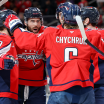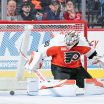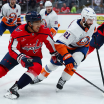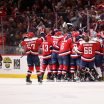Back in the summer of 2000, or nearly half his lifetime ago, Brooks Orpik's NHL journey began in Calgary when the Pittsburgh Penguins chose him with their first-round choice, the 18th overall pick in the draft. The League and the game were different in those days, and evidence of that can be found in the scouting reports of a teenaged Orpik from nearly two decades ago.
Grand Achievement
Brooks Orpik isn't much for personal milestones and achievements, but his teammates have plenty to say about him as he plays in his 1,000th NHL game
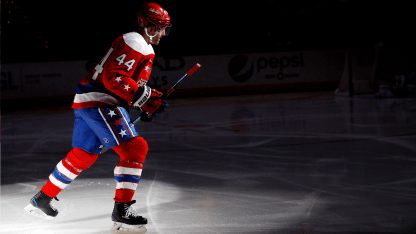
By
Mike Vogel
WashingtonCaps.com
"A very good skater with excellent agility and lateral movement … good straight-away speed … a patient, confident puck carrier who makes good decisions with the puck … is capable of joining the offensive rush, often leading the attack … has very good passing skills and a very good shot from the point … anticipates the developing play very well … dominates the defensive zone, effectively clearing the front of the net … plays a very aggressive and physical game, finishing his checks with authority … uses his impressive size and long reach to his advantage … needs to improve his consistency."
- Central Scouting Report on Brooks Orpik, from 2000 NHL Draft Guide
"Extremely smooth and talented. A very complete all around package who can play the game any way you like it. Plays with poise and confidence. Has excellent size, combined with smooth skating ability and puck movement skills. Can and will abuse people physically. Will jump on the attack and join in to create odd-man rushes. Has great size and strength, is tough, keeps crease clear, has good "D" zone awareness, and is strong down low along the boards. Sees the ice well and makes beautiful, crisp outlet passes, always right on the tape. Plays with a mean steak. Picked his level up a notch in collegiate playoffs. Not quite offensively skilled enough to QB the PP, but a safe bet to be a 3rd/4th defenseman with mobility and physical presence for the next dozen years. Great stamina; a workhorse." - Red Line Report - June, 2000
Central Scouting ranked Orpik fourth among all North American skaters going into the draft. Red Line Report ranked Orpik 13th overall and fourth among defensemen, and the scouts and the Penguins got this one right. Orpik played 11 years and more than 700 games with the Pens, serving as a top-four workhorse and helping Pittsburgh to a Stanley Cup title in 2009 before moving on to Washington in 2014.
On Monday night against the St. Louis Blues, Orpik will skate in his 1,000th NHL game. He will become the 330th player to achieve that milestone of the more than 7,800 players in league history. Going into this weekend's NHL action, there were 388 players whose NHL careers have spanned but a single game.
Stanley Caps | Brooks Orpik
At 38 years and 110 days, Orpik is the 14th oldest of the 330 players to reach a grand, and he is the seventh in his 2000 draft class, following Scott Hartnell, Justin Williams, Nick Schultz, Antoine Vermette, Marian Gaborik and Ron Hainsey.
Along with Williams, Hainsey, Niklas Kronwall, Henrik Lundqvist, Matt Hendricks, and Deryk Engelland, Orpik is one of seven players from the class of 2000 who is still active in the NHL. (Gaborik is on injured reserve with Ottawa, but has yet to appear in a game this season.)
While Orpik is far from the first player to achieve this grand milestone, he is the first to do so without scoring as many as 20 goals over the course of his career, which is another testament to his underlying value. Since the League reopened for business following a season-long lockout that killed what would have been the 2004-05, a gradual but significant shift in the way the NHL game is played and the devaluation of certain skills and assets has thinned the ranks of Orpik's ilk from NHL bluelines.
Take another look at those scouting reports from 2000. How long has it been since you heard of a player who "dominates the defensive zone?" We certainly don't hear nearly as much about "clearing the front of the net" as we did in 2000, either. Who was the most recent player with "the ability to control the game with his physical play?" And how many times have you ever heard or read, "his physical play kind of spearheaded our whole attack" about any player?
When he was drafted in 2000, Orpik was an excellent fit for what the game was and what the league was in those days. But the stay-at-home defenseman has been an endangered NHL species for a decade now, and Orpik is still active and thriving and performing well enough to remain viable.
"Believe it or not, I actually was kind of fast in my twenties," Orpik told me a few years back. "But the game has obviously changed a lot since I came in. And I think it's fun playing with younger guys too, because younger guys push you to be better and to do different things."
Probably the most remarkable aspect of Orpik's longevity in the league is the determination and discipline he has displayed in his approach to nutrition and training, and in his ability to maintain his game and his mobility to keep up with the waves of younger players always coming into the league.
Braden Holtby
That speaks a lot obviously to his intelligence. As a person, he adapts and finds ways to help the team. He is never a guy you're going to find complaining about the game changing. He knows that's just negative energy. He finds ways, he battles through things. He works to be in the absolute top shape he can be in to compete with these speedy young kids. And he is so much more than just a hockey player on the ice; that's a huge reason why his longevity has lasted so long. He is not a coach per se, but he is like a life coach to a lot of the kids. He is one of those guys that his leadership is invaluable in growing a team and getting the best out of guys. So it might not show up on his stats sheet or whatever, but he is instilling confidence through a lot of other guys, and it's showing up on theirs. That's a big thing.
Brooks Orpik
I think once you get comfortable in this league, you're probably going to be pushed out by somebody. Some guys kind of laugh at that, the people that say it's harder to stay here than to get here, but that's definitely true. There are always plenty of guys trying to take your job, I don't care if you're 25 or 35. That's always the case, and as soon as you get complacent in this league, you're in trouble.
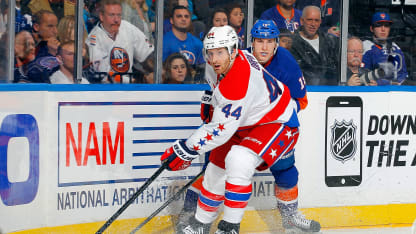
© Jim McIsaac
Madison Bowey
Just the way he carries himself off the ice is what you notice the most. He is the first one at the rink every day and he really makes sure his body is able to go. He does the little things off the ice like stretching and by working out and making sure he is in the top shape that he can be to perform well on the ice. And then on the ice it's just his presence in general. I think everyone knows that when he is out there, he is there to do a job and he is one of the best shutdown defensemen in the game today. I think for us, for myself especially just coming up last year as a young guy, he really helped me with his leadership. Just his lifestyle is something you can look up to and kind of model after. I think he is a guy that really gets it and understands the game. You can tell he has been here for a long time. He does all of the little things right, and it adds up to being a true pro. That's what it's all about, and that's the biggest thing I've learned from him is just how to be a true pro and carry yourself on and off the ice.
Tom Wilson
It's no secret he take care of himself, he takes care of himself really well. And a lot goes into that, a lot behind the scenes that people don't realize. He has played a lot of games, he has been around a long time, and I don't think he's ever really taken a shift off in his career. Those are hard miles put on the body, and a lot goes into getting yourself ready every night. He does his warm-up and gets the body moving. He is a guy you hope just keeps playing. He is so fun to have around, and such a big piece of this team.
Lars Eller
He has been good at adjusting, and in the game today you need to be able to adjust but still play to your strengths. For example, when I came into the league eight or 10 years ago, it was a lot more physical, there was a lot more hitting and a lot more grind along the boards. Now the game is a lot more speed and skill and a little more east-west; it used to be a lot more straight north-south. I think that's been changing a little bit. He told me he came in last year and lost a bit of weight, and looked a lot more agile, and he said he changed his training in the offseason, too. So he is a true pro in the way he handles himself and the way he prepares and the way he has been able to adjust his game to the game of the NHL.
Alex Ovechkin
Obviously everybody's different. Someone doesn't drink beer, right? Someone doesn't drink Coke. You try to be healthy. Maybe one day I will do the same, but everybody's different. He is a real pro and he shows the young kids what to do and how to do that. I hope they will learn, and I've learned a lot from him as well. But how I said, everybody is different. But it's good to have him around and it's good to take the experience from him. He is one of a kind.
John Carlson
He is a true professional, and I hate using that term, because we're all professionals, but he is very self-aware. I think that when you can look in the mirror and tell yourself what you need to work on and what you need to get better at, what you need to adapt to, it can be pretty sobering for anyone, no matter if you're the best defenseman in the league or the worst. He has certainly kept up with whatever the changes have been and has been more than effective, In fact, in a lot of ways I think he is better now than he was then.
Matt Niskanen
The game is so different now than when he first came up, and he was probably drafted for those purposes. But he was smart enough to recognize what he needed to do, and he had a full commitment to make sure that he could do it. Based on what he has told me, getting a little leaner has allowed him to stay mobile and that's the biggest thing in the game now. If you're not mobile, you just can't play. So he found a way to stay mobile even with age, and that's a tribute to his conditioning and how he treats himself. And then, just as a teammate, he does the right thing all of the time. His attitude is so selfless. He has the right approach. He told me once, 'Personal goals are good, but they can't trump team success.' And that is very evident, and he doesn't even have to say that - everybody knows that's the way he feels about the team. He has been a really good partner for a lot of pretty good defensemen, enabling them to do their thing. He has been a really solid player, partner and teammate. He brings a winning attitude and he has brought it to two different clubs now. It has resulted in success.
\\\\\\\\
It has resulted in 16 years worth of success, and a couple of Stanley Cup championships for Orpik, one in 2009 with the Penguins and another in 2018 with Washington. But when Orpik signed with the Caps on July 1, 2014, the move was panned, largely because of the five-year term. Fortunately for the Caps, Orpik had a big believer in newly minted GM Brian MacLellan, and the rest of his teammates quickly grew to regard him reverently.
Days before the NHL's annual free agent shopping season got underway that July 1, MacLellan was attending his first league meeting of all the league's general managers since taking over as Washington's GM in late May. During a break in the proceedings, the 30 general managers spent some time talking shop with each other.
"Everybody is kind of informal," says MacLellan, "We're talking to each other, 'What are you looking for? What are you trying to do?'
"I said, 'We'd love a left-handed, defensive, veteran defenseman.'
"And [longtime GM] said, 'Well, good luck with that!' They were laughing at me."
The Orpik signing was widely panned, but MacLellan never wavered from it. To him, it made no sense to notpursue and woo Orpik at that stage of the team's life cycle. Analytics devotees predicted all levels of impending doom, but MacLellan never had any doubts. The signing was necessary and would have been a good one even if Washington didn't win the Cup last spring.
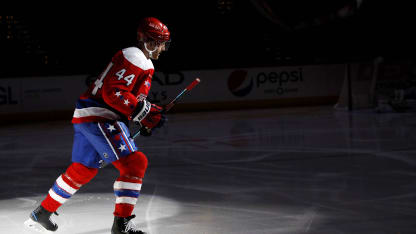
© Patrick McDermott/Getty Images
A change in culture was needed, and Orpik was a big part of that. The Caps were at a crossroads when MacLellan took over for George McPhee and Barry Trotz replaced Adam Oates behind the Caps' bench in May of 2014. Ovechkin and Backstrom were still in their prime years, but the clock never stops ticking, does it?
Brian MacLellan (quotes - all relating to the signing of Orpik - are from a Sept. 2014 piece I wrote on the remaking of the Caps' defense)
We've been sitting here for 12 years doing the same thing. We're not going to develop one of these guys. We don't have any. You have to do it. What's the alternative? You get roasted for doing it and you get roasted if you don't. Why not jump in with both feet? It's going to be a lot more fun.
Where are you putting the value? A dollar value on puck possession or shots for and against doesn't make sense to me on a veteran defensive defenseman. What effect does he have on our whole group, how do you measure that, quantitatively?
Already you can see the effect he has had on Carlson, [Karl] Alzner and the ability of our team to slot guys properly. Karl Alzner becomes a better player from watching Brooks Orpik play. Orpik does stuff like separating guys from pucks, stuff Karl doesn't do. [Orpik] blocks shots; he's a better penalty-killer. All these things, Karl is going to learn from Brooks. And Carlson plays with more confidence because he is with Brooks. There is an effect on your top four that is unbelievable. All of that is also going to translate into better goaltending.
You've got to believe that players learn from other players, just as much as they learn from coaches, on and off the ice. The way he carries himself, the way he goes about his business, how do you put a value on that? We've never had that. Where's your mentor? Where's 'your guy?'
So what, he's 34. There is a huge value that is not quantifiable. I think it's going to translate, I hope it translates into wins. You've got to build your team from the back out. We're going to have a solid core here, a solid structure. This is where we are. And then if we can improve this part, we're going to get to the next level. We're going to have a base that we're not going to fall below, because our defense and our goaltending is going to be more solid and our power play is going to be good.
Orpik (9/30/14)
Thankfully I'm not a big social media guy, especially in the summer. I used to read everything when I was younger, and I don't read much stuff anymore. Once I leave the rink, it's no more hockey for the most part. I've just found other interests, and I think that's healthy. No matter how well you play or how badly you play, there are always going to be people who support you and people who are going to doubt you. You've just got to work hard every day and believe in yourself. As soon as you let the external expectations or external opinions creep into your game, it goes south pretty quickly. And confidence is a big thing in this game. The coaches and management made it pretty clear why they brought me here and told me not to put any extra pressure on myself or try to do anything that I don't normally do. They said, 'Just do what you've done in the past and you'll be fine.' If other people want to judge me, that's fine. It's really just making sure the guys in this room have confidence in me.
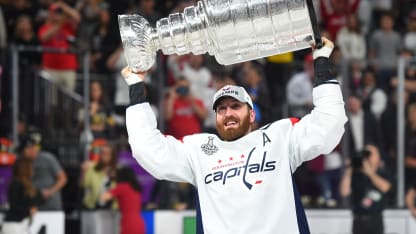
Dmitry Orlov
I think it's what everyone sees, he is good, experienced defenseman who won the Cup before, played on a good team and knows how to be a professional. You can see right away he is all mind and how he works on himself; you can see it from the first day. I think it was a good signing by the Caps to bring us Brooks from Pittsburgh. Nobody knew how he was going to be and I think he was a perfect fit and he is our leader. He is a totally professional player and at his age to play at this level you can take hat and [mimes a tipping of the hat].
Carlson
What has made his career so good is his level of play that has been so consistent. It's not one of those things where his game - when we used to play against him - has changed much since then or fallen off or anything. I mean, I have a stinging feeling when I think about playing against him because he got me the one time, when I was coming into the rush, at home, on the blueline, right by their bench. It was in my first or second year, maybe. And certainly he is a real responsible defender and tough as nails, too. You hear a lot about guys around the league, around the locker room. You know, 'I skate with this guy in the summer,' or "I've played with this guy,' and you just kind of share stories about guys all the time. There has never been one that's even close to a bad story about Brooks. In fact, when I see people now, they say, 'Oh, how is Brooksie doing?' They go out of their way to ask me. I think his reputation will be remembered for a long time.
Holtby
It's one of those things where I had played against him a few times, but those guys are tough for us to see as goalies, because the work they do is away form us, kind of in the cluster at the other end. I knew he was regarded as one of the best defensive guys in the league, and obviously you know how strong and tough he is. I didn't know anything about him before, and once he got here, you're blown away by the person he is and the leader he is. He is a huge part of turning our culture around in here. And as a player, I was surprised at his skating ability and his puckhandling abilities. It's been underrated. He gets things done, and obviously he has dealt with injuries and come back and always finds a way to be in top form in the playoffs. He is the definition of a warrior.
Niskanen
I knew of his on-ice ability, and when I got traded to Pittsburgh I think right away I noticed his presence in the dressing room and how much guys respected him. And I found out very quickly why that was, how committed he was and what kind of teammate he was. I haven't seen a more professional athlete in my time in the NHL. Maybe Jere Lehtinen was the only other one, as far as their commitment and dedication to doing everything possible to be at the top of their physical performance. It's contagious, and it rubbed off on guys - how he practices and how he works in the gym and spends time in the training room. If he is not sleeping, he's got something going on where he is thinking about what he is doing and how it affects his performance. I think that's a good approach and a lesson for young players especially, just to see what it takes to be really consistent over a long period of time.
Wilson
Playing against him, he was one of the guys I remember. I was pretty young at that time - it was a long time ago - but he was one of those guys you're aware of when you're going into his corner. I've always admired how hard he played the game. When he came over to our side, I think a lot guys in this room were happy about it. It's nice to have him on your side. He was a big part of transitioning this organization into a first-class, winning mentality every day type of thing. He is an amazing leader and he has been that since day one that he stepped into the Caps' locker room.
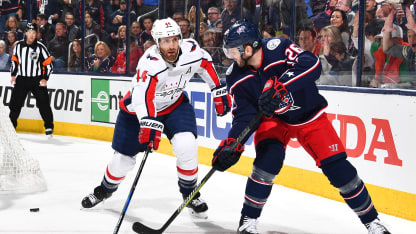
© Jamie Sabau
Devante Smith-Pelly
I didn't really know too much about him at all. I just knew him from when I played against him when he was with Pittsburgh, and then here, and we had a good amount of collisions. I just knew that he was strong. There wasn't any chirping - I don't really do much chirping out there and he's not really a talker, so we just kind of went at it with physical play. I knew that's what he was all about. But actually meeting him and getting a chance to know him, he is an amazing guy. He is a good role model, not only for the younger, younger guys, but also the younger guys like me, who are not so young, but still young. I've learned a lot from him and I'm really happy for him that he's getting to this milestone.
Nicklas Backstrom
I didn't really know him before as a person, and I had only played against him for a few seasons. Obviously, on the ice he is a tough player to play against. Every time you played Pittsburgh, you looked at him in the lineup and he was one of those guys that you pay attention to and make sure you know when he is on the ice. I just think it's way better to have him on our side and then when you get to know him too, he is such a great guy and such a humble guy. He is one of those guys that you want the best for every time, and I think he deserves every credit that he can get. Just the way guys talk about him - he is so respected. He is such a great teammate and a great professional. I really love him.
T. J. Oshie
I feel like when I played against him when I was younger, I looked at him as a leader, the way he played on the ice. I've always admired guys who can go out and make big hits while still playing the game of hockey, which he can do. The biggest difference was just the friendship that grew once we became teammates. My respect for him as a hockey player is the same as it was when I played against him. You just like him a little more because he is hitting the guys you're going against instead of you.
Ovechkin
I didn't have to make any contact with him anymore - maybe only in practice. It was always a battle between me and him when we played against Pittsburgh. He is a physical guy and when he signed here I was pretty happy to have that experienced guy in our locker room to help this team grow. His leadership is very good on the ice and off the ice, and obviously he is a real pro.
Eller
My perception of him before, as a player playing against him, was that extremely strong, one of the strongest guys in the corners and in front of the net. He was just very hard to beat standing still in a physical battle, so you always tried to just get space on him so he doesn't get too close to you. So he was definitely hard to play against, very hard to play against. Now, I still think the same thing. He is still very strong - he knows his job and knows his strengths. He is just a really good guy to have on your team, a very humble person and a veteran guy who keeps things calm. He's got this nickname, right? 'Batya,' it's 'big father' or something like that because he is like a father to some of the young guys at times. We're just happy to have him.
Todd Reirden (1/26/15)
Now Brooks specifically, he adds a physical presence. He adds a way that he carries himself and goes about every day. He is a complete professional in terms of his on-ice and off-ice play. His preparation is second to none, as far as how he goes about his business. I think that's really rubbed off on the entire team, and in particular it has helped out with the defensive group. The way he practices, and the way he prepares off-ice in terms of his conditioning and the way he takes care of himself nutrition-wise, the leadership, having won a Stanley Cup and been part of Olympic teams, he has been able to add that winning element and the importance of establishing that culture. Those are things that you may not see that go on during the game. He brings a certain presence. Obviously everyone sees the physical presence, but also in terms of raising the accountability from all of our players but in particular our defensemen and what is expected out of them. That winning attitude and the environments and atmospheres he has been in in the past have helped him come in and have a real impact here with changing that.
\\\\\\\\
Midway through his career, the Penguins made a trade deadline deal to acquire the venerable Gary Roberts from Florida. Calgary's first-round pick (12th overall) in the 1984 NHL Entry Draft, Roberts was a teammate of MacLellan's on the 1988-89 Stanley Cup champion Calgary Flames.
At the age of 29, Roberts missed much of 1995-96 and the entire 1996-97 season with a severe, career-threatening neck injury that was said to be career ending by some. Roberts proved them all wrong, dedicating himself to fitness and nutrition and going on to play in the NHL until he was 42. He impacted many players on several teams over the final decade of his career, including Orpik. These days, he is a trainer who trains both amateur and pro players in nutrition and fitness.
Orpik
[Roberts] is pretty assertive when he comes to a new team or a new room. He doesn't hold back and he tells you exactly what he thinks is right. And the majority of the time he is right, to be honest with you. He had been around a long time when I played with him. You look at what he does now, and I think he just genuinely likes helping people out. That's why he got into the business that he is in now. When he started to do it, he just wanted to do it with a small group of guys and now he is probably making more money now than he did when he was playing, but that wasn't his goal at all. I think he just loved that part of the game and loved passing that on to other people. He thought it was his duty to filter that down to younger guys, and he is probably the one guy who has had the biggest impact on my career in a lot of different ways.
It's different for everybody. My body probably reacts different than other guys' bodies. I don't think there is a right or wrong answer, but on an individual basis there is definitely a wrong answer. For me specifically, I used to eat these huge dinners and then I'd get up and just feel awful in the morning because you eat a huge dinner and then you go right to bed. For me, if we skate or workout in the morning, I usually have a big breakfast, big lunch, and then something a little bit smaller as the day goes on. So instead of having three huge meals now, I spread it out a little bit smaller throughout the day, like six meals. I've got to be honest, my alcohol consumption is probably a lot lower than it used to be. I can't get away with that anymore. I think league-wide, guys just take a lot better care of themselves now. You look at the way we used to go out and have a good time on the road and stuff like that; you just can't do it anymore. There are no bad teams in the league, and guys are so well trained and in such good shape that you just can't do that anymore. You'll get exposed badly if you do that. It was a culmination of things. It's obviously a lot easier when you're at home to eat well and to know exactly what you're putting into your body. You've got to have a lot of discipline and put in more effort when you're traveling, and that is something I've learned to do.
\\\\\\\\
For the last few seasons, Orpik was the only player on the Washington roster who had the experience of winning a Stanley Cup, who knew what it took to get those 16 victories required to win and raise the coveted chalice. As such, he served as a bit of a compass at times last spring when the Caps were vying to win it for the first time, which they eventually did in Vegas on June 7.
It's not Orpik's style to be a "rah-rah" or to get into guys' grilles and chastise them for mistakes. But if a player goes to him with a concern related to the game or related to life, he's more than willing to share the benefits of his wisdom, insight and experience.
One of the many great things about our game is that most players are willing to do everything they can to help younger players. They do so in full recognition of their own mortality in the game, knowing they may be helping to replace themselves right off the roster or out of the league.
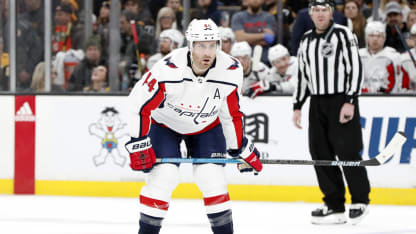
Orpik
It seems kind of funny, right? Some of these younger guys, you're trying to help them out as much as possible, and they're obviously improving. And a lot of that help you're giving them is a direct reason for their improvement. But at the same time, those are that guys that are eventually going to push you out of the league and take your spot. I don't know. I've definitely played with guys who are very guarded when it comes to helping other guys and passing on knowledge. I've always thought that makes it pretty uncomfortable in the locker room, especially between the two guys or just the whole room in general. Sergei Gonchar is a guy who helped me out a lot. I played with him in Pittsburgh and I obviously can't do the things that he did, and I could do a lot of the things he couldn't do, so I wasn't necessarily trying to take over the things that he did. But he showed me a lot of little things that seemed very, very minor at the time, things I still remind myself of on a daily basis. He was a guy who was very gracious and very willing to help guys out. He wasn't overbearing, but if you went and talked to him, he loved to talk to guys about all kinds of things.
Niskanen
He doesn't babysit people, but he's there. He is always there if you need him. And the example that he sets is first and foremost a really good example, especially for young players. I think he did a really good job with Kuzy, for example. In Kuzy's first full year here, Brooksie did reach out a few times, and it was noticeable. Kuzy became more talkative after that. I think as the year went on, he became more confident on the ice, and he is off to the races now. Now Kuzy had the ability and he was probably going to get there anyway because of his abilities, but I think Brooksie - with just those little gestures like that - is an example of team, and caring about guys and looking after young guys. He maybe helped him get on his way a little bit sooner.
Evgeny Kuznetsov
At that time, he was like 32 I guess, or 33, whatever. Back home, when he have a guy like that who is maybe not the oldest but a guy who has a lot of experience and is the actual oldest guy on the team, you call him 'Batya,' because it means like a father on the team and he kind of understands everything. He kind of liked that nickname, and I don't think it's bad, right? It's just funny and then some guys started picking it up and whole team started calling him like that. It's the kind of nickname that shows respect. He is a nice guy, nice person, and he never teaches you anything about the hockey, never teaches you about anything. But sometimes, he says something. If you listen to what is coming form his mouth, you can understand what he means. He is not going to point out your mistakes, but he can say something very, very smart and sometimes if you are smart enough, you will understand what he means. That's what makes him great. Like I said, he is never going to point to your mistakes. He always stays positive and is always positive. Sometimes, like every player, he gets frustrated too. But his frustration is very short, like maybe a couple of seconds and then he kinds of comes down. And at the same time, he can make jokes right away.
Holtby
With him, he automatically has that respect of the team. He is the guy who can say the things that need to be said to anyone in the organization because he is well thought out. When he speaks, he speaks from knowledge, not out of anger or frustration. He speaks of what needs to be done in order to create a better atmosphere and a winning culture. It's not a thing that's easy to gain the respect of everyone and still hold everyone accountable that way. That's the sign of true leaders, and that doesn't come around every day. It's one of those things where we've been very, very fortunate to be able to learn under him and go with his guidance, ultimately to a Stanley Cup.
Smith-Pelly
After losses, some guys who maybe haven't been through it would be a little bit down. He was there to let them know that there was a bigger picture, it doesn't matter and all that stuff. It was great to have him in there to be a calming influence on everyone, old or young. I remember before the fifth game [in Vegas], he was talking to [Jakub Vrana} and [Andre Burakovsky]. It's the clinching game and he's listing off all these superstars and Hall of Famers that haven't won the Cup before, and telling them, 'This is your chance right now to get off that list.' And then V scoring the first goal, I don't think that's really a coincidence. I'm sure there were nerves before, but like I said, he's a super calming influence.
Oshie
During the playoffs, you could see his relentlessness to just keep going. And that was the one thing that I feel like was hard for us to find, was when things started going bad, to just keep going and push through. He doesn't seem to get frustrated out there; he just keeps pushing on. And last postseason it seemed like it bled through to the rest of the team. He is always calm when he speaks, and he is always very direct. That calming presence helped us in the long run because eventually - no matter what happened throughout all of the playoffs last year - we were extremely calm and we were just focused on going out there for the next shift.
Backstrom
I actually think it meant more than people think. He is one of those guys who keeps us calm in between games. Whatever we did, win or lose the game, he was still really positive. He just said, 'New game in two days. We've just got to reload and regroup and look ahead.' He was one of those guys that really looked after us during the playoffs. He kept it calm and kept it positive, too. I think that's the way to do it. That was a big success for us and he was probably the leading guy there.
Holtby
I think the biggest thing he did for us was he kept our eye on what we actually wanted to accomplish. After big wins or big series wins, he was the first guy to say, 'Okay, it's over. We're moving on, we've got more work to do. Beating Pittsburgh isn't our Stanley Cup. Winning Game 7 against Tampa isn't our Stanley Cup.' Obviously there is a lot of energy and a lot of emotions, and you can get too high in those moments. And he was the guy who brought us back down to earth and kind of zoned us back in, be it just through his demeanor or in practices. That's a sign of someone who has been there and knows that your work is not over until it's over, and it doesn't get easier, it gets harder. He showed us that, and I think that was one of the big lessons that our team had to learn in the last few years, and I think we've learned it.
Wilson
I think 'respect' is a big word. He had a ton of respect from guys who played against him, and then he came into our room and he earned a ton of respect from his teammates. With Brooksie, I was a good chunk of age younger than him, but that's just who he is. He is really good friends with almost every guy in the locker room whether you're 20 or 19 or 35. He earned the respect right out of the gate with this team. He is a guy who knows what it takes and he is a great pro, a great friend and a great teammate.
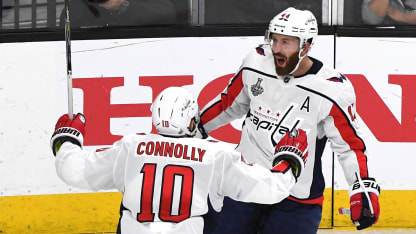
© Ethan Miller
Carlson
It's every day if it needs to be, or it's once in a while - but when he talks, guys listen. He knows what it takes, and that was a big thing. From the time he arrived in D.C., he was a compass and a guy that if you ever had a question or if the team ever needed some guidance on a given night, that was a pretty good spot to start looking. It's not easy when you come into a new team to guide them right away, but it was a seamless transition and he is pretty close to the guys in this room.
Kuznetsov
I feel like especially last year when we entered the playoffs, no one talks about that experience. No one talks about how important it is, how big those moments, how big those mistakes in the game are. We understand that you don't have to say that. Young players when they come into the league, they don't know what is that pain, when you lose a game in the playoffs and you go for a vacation. That's probably the reason why we play our game, and we don't change for those typical playoff style games when you just chip, chip, chip and you put the puck deep and you try and outwork [your opponent]. Sometimes I feel like the more loose you are - but at the same time you understand the momentum, you understand the time - that is how you can play the hockey. And Batya, he never said, 'Put the pucks deep and play harder.' We all know and understand that we have to play hard and what we have to do. But the things he said, it's very short and it's some key things. It doesn't have to be those big speeches when people are saying those big words. If you say something, you have to go on the ice and do that stuff, and he always does that. People like him, they don't have to talk a lot. They can say a couple of words, and you can understand right away.
Especially off the ice. Sometimes the veteran guys they can be hard on you, right? They can be like bad guys, right? But if you are smart enough and Batya makes a joke about something, you can understand what he means and you can change. That's the reason why guys like him - the older guys - they want to point out something you did wrong, they don't actually point at that moment. They somehow come from all the way back. If you are stupid, of course you are not going to understand right away. They will finally somehow get on you, right? But I'm glad we have smart enough guys they will understand when they made a mistake. The guys like Brooksie don't even have to say something because we made a mistake, the next game we are not going to make the same mistake again. I think that's good for coaches and leadership guys. They don't have to worry about that stuff, because we are good enough to understand when we have to play better, when we made mistakes, when we play good, when we can stay loose, and when we have to go out there and grind.
Carlson
He was huge. I think when it comes to that time of the year, you take any advice or knowledge that might be gained. And he is not necessarily the most vocal guy, but he certainly talks and lets us know when stuff is going good or bad or how he feels. But he really came at us from a different angle with insight into certain things, and that's big during the ups and downs of the playoffs. You win a game, and you're so high. But you go down 2-0 to Columbus, and you can imagine the feeling then. He just always seems to know the right time to say something and the right things to say. I think in a lot of respects he steadied our ship single-handedly.
You fast forward to this season, and you look at our defensemen. We've got [Bowey]s, [Jonas Siegenthaler], [Christian Djoos], and [Tyler Lewington] was here for a bit. Even [Michal Kempny] is still fairly new. People don't think of him like that, but he is still fairly new to the NHL. To see a guy like that, I know it changed my outlook on a lot of things. He has helped me along the way with certain concerns and questions, whether it is about hockey or about life. He is one of those guys who has got it all together. You look up to guys like that because you know they can help you through any situation personal or professional. It was a big part of my career to learn under him and see the way he approaches the game, and to apply my knowledge to that and I think a lot of guys feel the same way.
Niskanen
Even in the previous years leading up to last spring, he said a lot of things that turned out to be very true, and they kind of clicked for us last year. The further we went, just the conversations we had casually at team meals or whatever, he knew what to expect and he knew the types of things that could happen and what it would be like. He is a pretty level headed evaluator of where we are at, too - what happened in a certain game, where we are at in a series, what the other team is doing. He is just a wealth of knowledge because he has been through a lot. He has been through bad teams, and then teams on the rise, and then he has been on teams that have been near the top of the league and have had to deal with expectations, and then he has been on a few underdogs. You could say we went from being a high expectations team to being closer to an underdog last year. So he has been through it all, and he has seen just about everything that this league has to offer. I think even if it's just 30 seconds of talking with him about what he thinks about this or what he thinks about that, he is a good guy to bounce information off of, just for clarity.
Orpik (6/13/18)
I definitely appreciated this o[Stanley Cup championship] a lot more. I think as you get older you really appreciate and realize how hard it is to accomplish this, and you need a lot of things to go your way. But you also need a really good group of guys to perform to their highest capability at the right time of the year. I think with the way this season started too, with a lot of people doubting that we'd even make the playoffs, we proved a lot of people wrong, and that felt pretty good for the group.
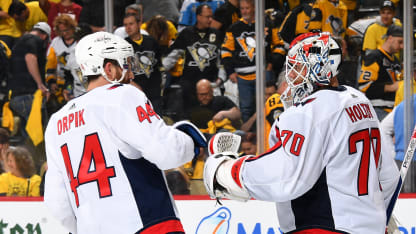
© Joe Sargent
\\\\\\\\
Of all the athletes I've covered in nearly a quarter of a century on this beat, I can't think of one with less of an ego than Orpik. We write and talk all the time about certain players who have the ability to make their teammates better on the ice. Orpik is one of those rare players with the ability - and willingness - to make teammates better both on and off the ice.
That off-ice quality extends to us in the media, too. I've learned a great deal from my conversations with Orpik over these last five years, regardless of the topic. He has helped advance my understanding of the game in numerous ways, and I'm grateful for the knowledge and wisdom he has shared with me over the years. He has made me better at what I do, and I'm far from the only one in my profession who will tell you this.
Typically, Orpik isn't much for this hubbub about playing in his 1,000th NHL game. His focus is always on the team rather than the individual. But his family is certainly and rightfully proud, and so are his teammates.
"I know some people make a big deal about it," said Orpik, seven months ago. "To me, I think you just want to play as long as you can and at a level that you are comfortable with. And once you can't play at that level anymore, you take a step back.
"But if it happens, it happens. It would be a cool thing. But I think comparatively speaking to some guys I've played with, I'm not too caught up in it."
It's happening. And it's a cool thing. Congratulations, Brooks. And thank you.

